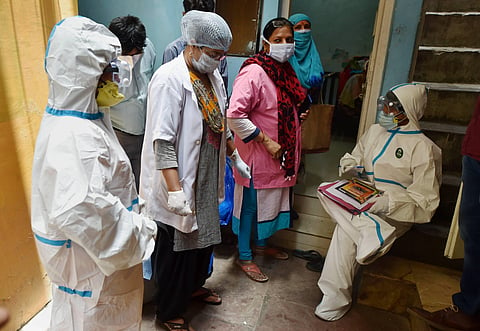

NEW DELHI: About 23.5 per cent of total samples tested to assess the true extent of Covid-19 spread in the national capital were found to have antibodies against coronavirus or past history of infection, the Centre said on Tuesday.
Given Delhi’s population of 2 crore, this means that nearly 47 lakh people may have contracted the infection already and would have recovered unknowingly. This also implies that about 1 in every 4 in the city has already had the infection by the first week of July.
Also as the official cumulative infection figure till July 10, the day when the survey was wrapped up, was only 1,09,140—this also suggests that less than 0.5% of actual cases were detected.
In a press briefing, Dr Sujeet K Singh, director of the National Centre for Disease Control — which led the survey — said that as the sensitivity (or reliability of detecting true positives) of the testing kit used was nearly 92 per cent, the adjusted seroprevalence was 22.86 %.
While the highest positivity of 27.87 % was found in New Delhi district—the lowest, 12.95 % was seen in the south-west district. Overall, there were 8 out of 11 districts with more than 20 per cent population infected.
“We, however, cannot yet conclusively say that Delhi is past the peak,” said Dr Singh.
The survey, by the NCDC in collaboration with the state government, involved testing 21,387 samples across all age groups.
The Centre said that it followed a rigorous multi-stage sampling study design and was carried out between June 27 and July 10. For the exercise, blood samples were collected from selected individuals and then their sera (part of the blood) were tested for IgG antibodies using Covid Kavach ELISA approved by Indian Council for Medical Research
"It is one of the largest sero-prevalence studies conducted in the country using the ELISA testing,” the government said.
Given that IgG antibodies appear nearly three weeks after the infection—those found positive would have contracted the virus by mid-June or earlier.
This also signals that an even higher number of the population could be infected by the virus as of now.
Virologist Dr Shahid Jameel, commenting on the finding, said that as Delhi has seen 3,663 infection deaths so far, the infection fatality rate turns out to be 0.08 % - similar to the indication from a finding by nation-wide ICMR seroprevalence survey which had shown that by April end, in non-hotspot districts, the seropositivity rate was 0.73 per cent.
“This tells me three things- infection has spread quite fast, there is no mortality rate reduction since April end and we may still be far from herd immunity,” he added.
An epidemiologist who is part of an ICMR expert group said that the results confirm that population prevalence in Delhi is among the highest globally and in line with the hardest-hit cities like New York and Stockholm in the pandemic.
The health ministry, on the other hand, insisted that a sero-prevalence rate under 25 can be attributed to the proactive efforts prompt lockdown, effective contact tracing as well as citizen’s compliance to Covid Appropriate Behaviours.
“However, a significant proportion of the population is still vulnerable,” it added, “Therefore, the containment measures need to continue with the same rigour. Non-pharmacological interventions such as physical distancing, use of face mask or cover, hand hygiene, cough etiquette and avoidance of crowded places etc., must be followed strictly.”